The Minecraft Loophole: Modern Subversion of Censorship
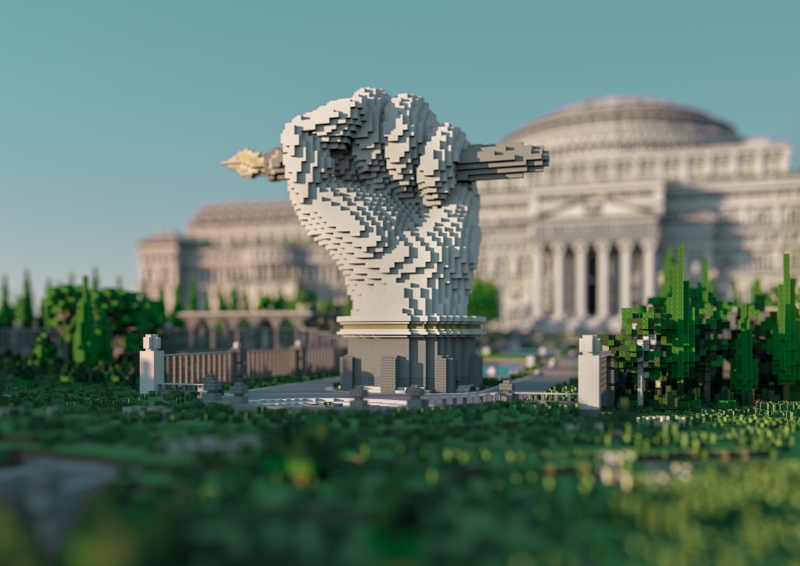
“We shall meet in the place where there is no darkness.”
– George Orwell, Nineteen Eighty-Four
It may seem ominous to begin an article regarding the hit Mojang video game Minecraft with a quote from George Orwell’s classic dystopian novel. 1 But for the sake of the serious nature of this topic, it is not merely convenient but necessary to do so. The topic in question: The destruction of freedom of information and the press in certain countries where journalists and activists are being censored under threat of imprisonment, or worse. These same regimes force young people to interact with censored or blocked informational wastelands that have been heavily manipulated by governmental disinformation campaigns coordinated by oppressive leaders.
On “World Day Against Cyber Censorship”, March 12th, 2020, the organisation known as Reporters Without Borders (RSF) released a means for individuals and journalists to subvert internet censorship in their respective countries. This is The Uncensored Library – which has been built inside a Minecraft server.
This article will not discuss the politics of any nations represented in The Uncensored Library. Instead, it will endeavour to discuss the innovative merit of certain groups and individuals to subvert the erasure of political commentary through the use of media or video games such as Minecraft.
The Uncensored Library

Minecraft has long been a place for people of all ages to express their creative freedom, test their survival skills and build friendships that can last a lifetime, or in some cases just until puberty. Minecraft is the embodiment of freedom of expression through its open-ended gameplay and the versatility of its basic components: blocks. Everything is made from blocks, from sandstone, to wooden planks, to even books. The organisation Reporters Without Borders have put this freedom to use and have constructed an intricately detailed neo-classical library. It took 18 virtual builders three months to build and contains 12.5 million blocks. The official website includes an informational film as well as the library’s purpose, the contributing authors and an up-to-date offline save file of The Uncensored Library that allows anyone entrance into its digital archives.
Immediately one can see how this differs from other equally impressive Minecraft constructions. Beyond simply serving as a breath-taking spawn location on an online survival server or a grand spectacle in a creative mode save file, this library serves the function of safeguarding and disseminating censored articles and books from journalists and media outlets in countries under strict government control. Contained within the block-formed books of Minecraft are the hundreds of pages of political commentary and detailed personal accounts, available in multiple languages, from inside some of the world’s most oppressive regimes. This act of defiant subversion is only possible through Minecraft as traditional media outlets and outspoken journalists are being suppressed.
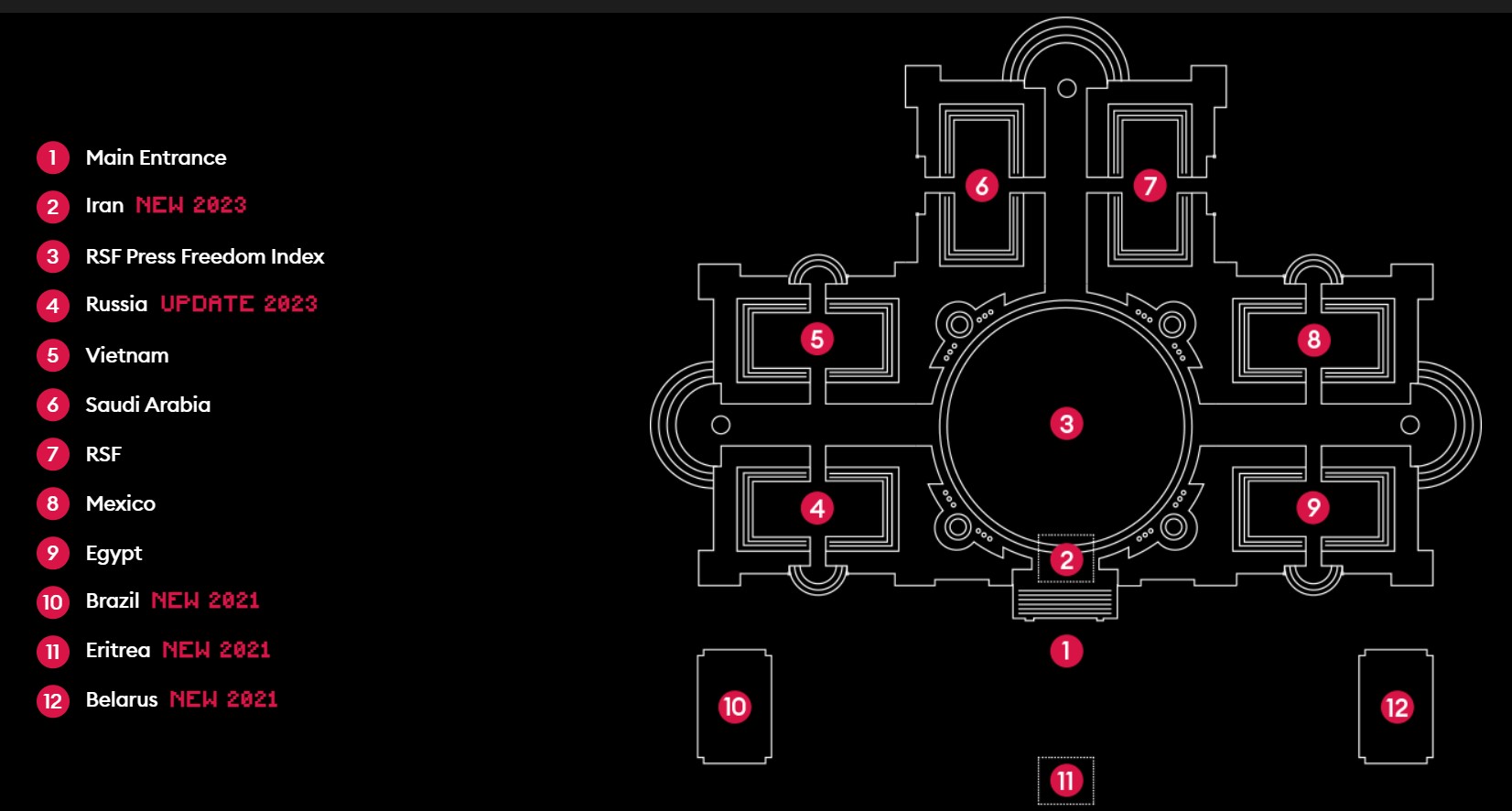
The library is complete with a full interior, as different wings and pavilions are designated spaces for articles written by journalists whose voices have been silenced, lost, or altered. Along with the articles, that can be read in the author’s original language or through an English translation, there are also eloquent monuments and block-art installations that reflect ideas of truth and press freedom unique to each nation.
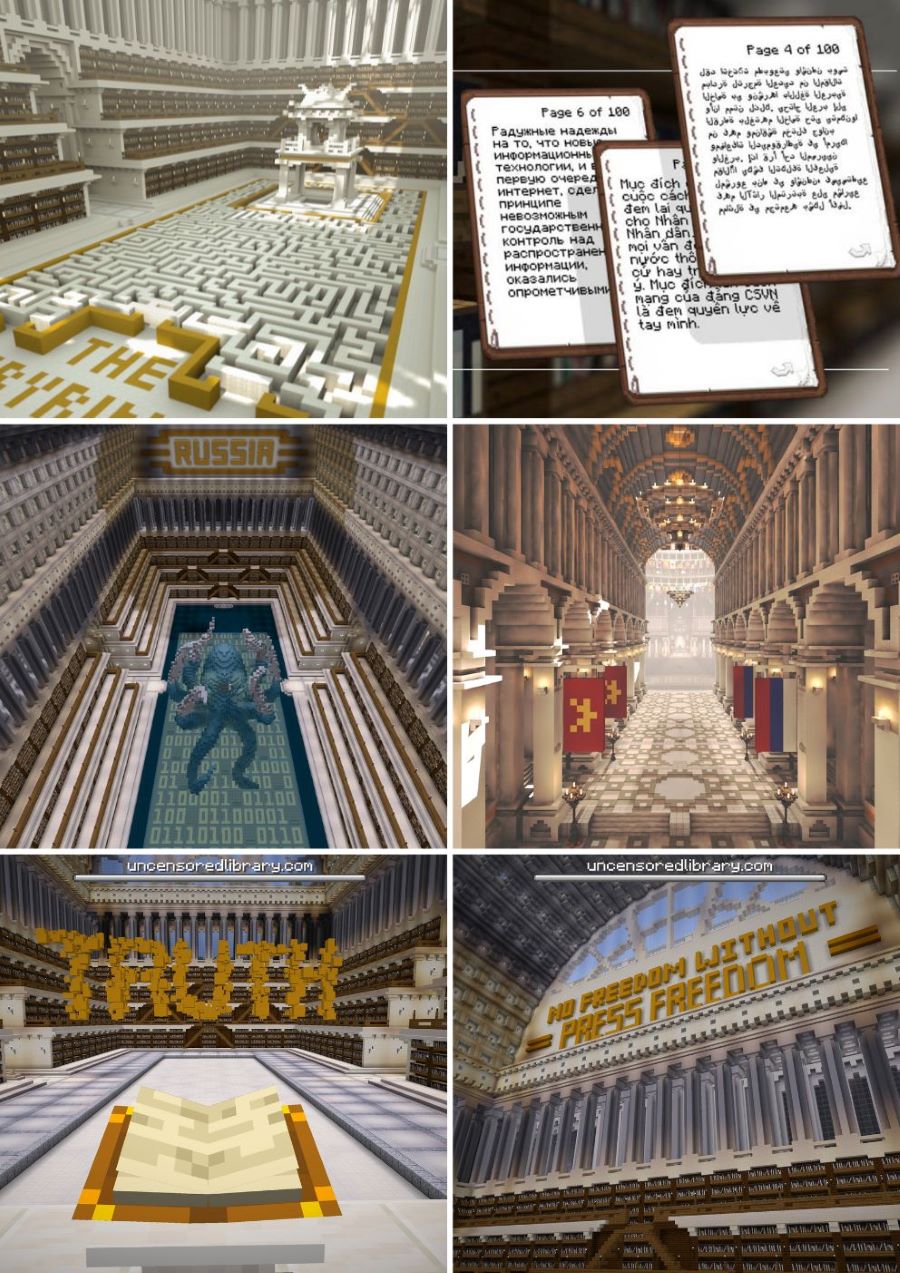
One example, is “The Labyrinth of Truth” in the Vietnam section which invokes imagery of a vast maze, with various entrances at one end and a traditional building at the other. This piece highlights the increased censorship of information and the “growing effort to make access to the truth as hard as possible” in Vietnam, where the only source of independent information is coming from bloggers and citizen journalists – both of which are being subjected to harsh persecution. Another example is the “Data Kraken” in the Russia pavilion. This large construction covers the entire floor space and depicts the mythical Kraken beast among a sea of binary. As described on a plaque at the entrance, the artwork symbolises the “immense effort” Russian leadership is undertaking to systematically control the internet and control “critical journalists.” Due to the implementation of a “blacklist of prohibited sites,” that can block websites without a court order, many people are getting prison sentences – even a misplaced “like” on a post could put someone jail. 2
The Uncensored Library was created to provide a safe space for journalists to upload censored articles in countries that seek to control freedom of the press. In order to grasp the full gravity of this project, one must walk the halls of the modern day Library of Alexandria themselves. Before reading further, I recommend downloading the save file and experiencing it for yourself.
What is censorship?
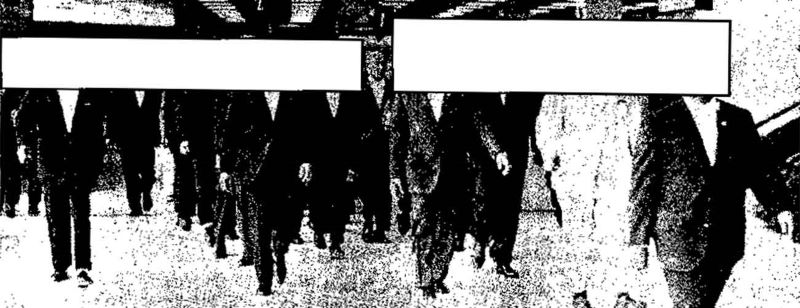
Without deviating too far from the focus of this article, it seems prudent to briefly examine the role of censorship throughout human history and how, in recent history, it has become prevalent in oppressive regimes as a means to preserve a vice-like grip on information dissemination both domestically and internationally.
Ancient Censorship
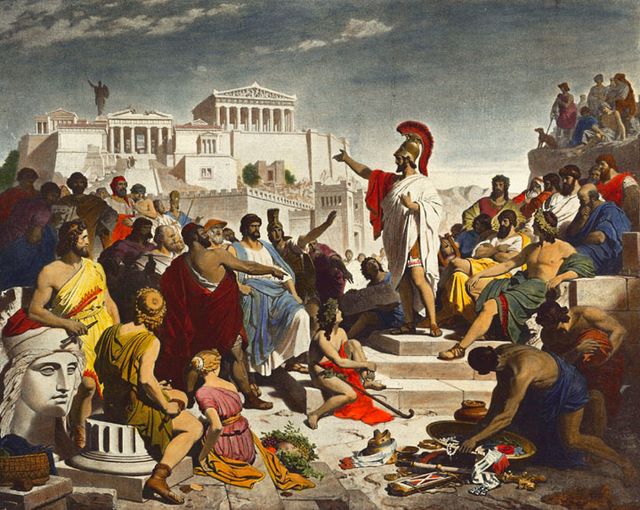
As a means of control, censorship has been an ever-present device used by those in authority to control populations since times immemorial. For example, the city-states of Ancient Greece and Rome would shape the perceptions of the populous in “accordance with the character and needs of the regime.” 3 The primary focus of this ancient censorship was in regard to the “gods of the city” and to the notion that every citizen was to respect the privilege of worship and religious conformity – a failure to do so would subject a citizen to hardships followed by legal ramifications if one spoke out against such matters. The force of such sanctions can be seen by the retaliation of the Spartan populous in the 7th century BC in response to a poem by the Greek poet and soldier, Archilochus, that promoted his act of cowardice as life-saving grace. If one is familiar with Spartan society, one may be able to predict the reason for such a negative response. But this is not to say every city-state in antiquity was identical, as in Athens, citizens were encouraged to freely discuss public discourse as it was believed by Pericles, an influential democratic leader of Athens, that without an uninhibited discussion of politics “the best interests of the city could not be served.” 4
Medieval Censorship
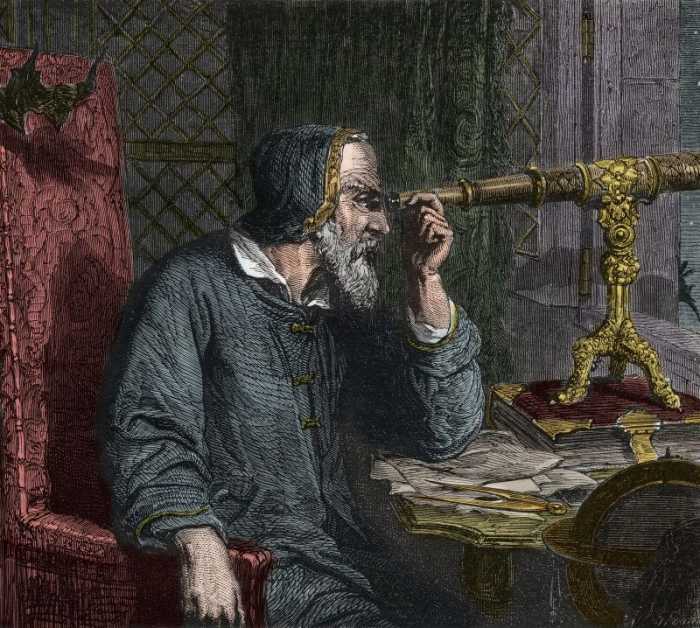
Furthermore, indeed almost 2000 years furthermore, censorship continued to exist in medieval Christendom. Medieval Europe was fraught with controversies, many stemming from the inability to separate political from religious differences. As seen in the Roman Catholic Church’s creation of the Index Librorum Prohibitorum (Latin for Index of Forbidden Books, the medieval equivalent of Russia’s Blacklist of Prohibited Sites) in the 5th Century AD, the suppressing of Galileo’s defence of the Copernican theory (that proclaimed the sun as the centre of the ‘Universe’) in 1633, and the promulgation of the Nicene Creed in 325 AD (a creed underlining exactly what Christians should believe) – one thing is clear. It mattered what people believed. This is because it informed not only religious action but, as the church and the state were inseparatable at this time, the political actions of authority as well. 5 With the advent of the printing press, this further exacerbated the “issue” of spreading information not officially sanctioned by the church or those in authority. This can later be compared to the disseminating power of the internet, and the measures modern day authority has taken to control information.
A Very Short Explanation of Modern Press Freedom
“Where there is much desire to learn, there of necessity will be much arguing, much writing, many opinions; for opinion in good men is but knowledge in the making.”
– John Milton, Areopagitica

Moving on, rather swiftly, is the advent of the foundational principles of modern press freedom. In response to the British government’s approval of a pre-publication censorship law in 1644 (which required media to be approved or changed), John Milton wrote the pamphlet Areopagitica, the title alone invoking ideas of ancient Greek democracy, which defended freedom of the press under the notion that, “Truth and understanding are not such wares as to be monopolized and traded in by tickets and statutes and standards.” 6 Milton’s sentiment can be further found in legislation passed by Swedish Parliament in 1766. This legislation became a first in the world for legal defence of freedom of the press and information. This Freedom of the Press Act laid the foundation for future democratic countries to adapt their own freedom of the press and freedom of speech principles – most notably the First Amendment in the US Constitution 7 and Article 19 from the Universal Declaration of Human Rights adopted by the United Nations in 1948. 8 Although most democratic countries around the world today, in one form or another, have attained a healthy status in regards to freedom of the press, many fall short. Obviously, those under strict dictatorships suffer the most, but, as seen in the Reporters Without Borders official rankings, there is nuance among individual country’s understandings and laws.
Video Games and the Subversion of Censorship

“Get back to Minecraft!” The screams call, as you, dear reader, toss your keyboard across the room and slump irritably into your Stream Labs gaming chair. Stress not, the original question still remains: With the proliferation of the internet, far exceeding the disseminating power of the mechanised printing press in the 15th century, how is information still being censored and how is media, specifically video games, leading the charge against oppression?
As mentioned at the beginning of this article, specific regimes, ideologies, and oppressive leaders will not be commented on, beyond simply addressing the origin and application of the selected media to subvert censorship. If a country or individual is mentioned more than others, that is purely due to the number of examples rather than any political bias.
Animal Crossing: Secret Protestors
“Animal Crossing is a place without political censorship so it is a good place to continue our fight . . . Even lawmakers . . . are playing this game.”
– Joshua Wong, Pro-Democracy activist
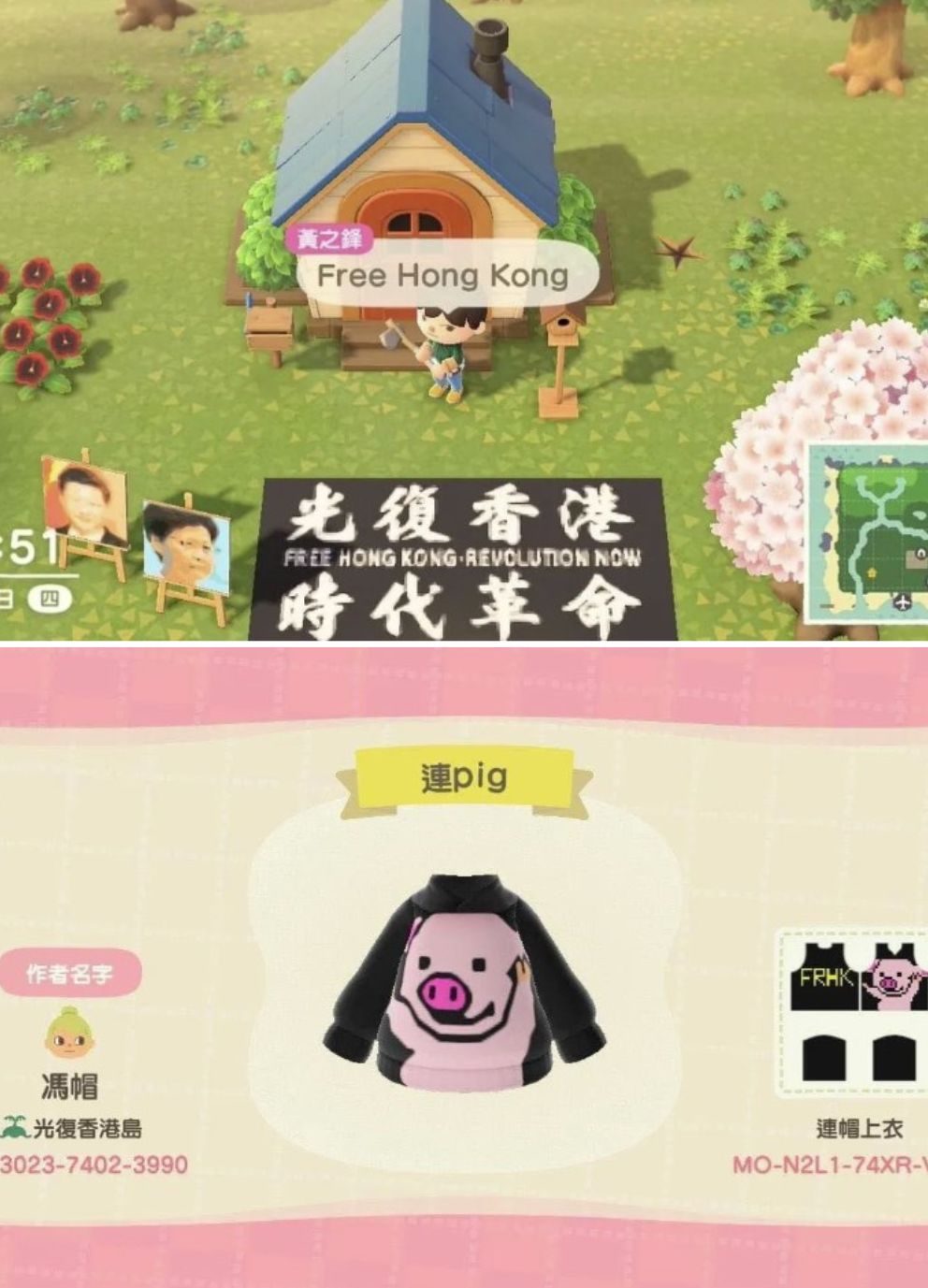
As the pandemic shook the world and many people were forced into lockdown, many were left isolated and in desperate need of escapism. Luckily, Nintendo’s Animal Crossing: New Horizons game was released and fulfilled this collective desire to escape. Players could engage in a single player experience or make use of the multiplayer features which allowed people to meet up virtually to share art, show off their respective islands, and…. protest against their government?
This is exactly what players in Hong Kong did when lockdowns forced them into isolation. 9 Players used in-game features to create artwork and protest-themed clothing which could then be shared online via QR codes. This allowed activists to not only continue their political commentary anonymously and from home, but it was also a “good way to promote . . . [their] mission to those who are politically apathetic.” 10 This example is similar to The Uncensored Library as it highlights the versatility of video games, as well as the adaptability of players, to use existing features within a game to subvert censorship and promote freedom of speech.
Devotion: Easter Eggs
“Only in countries with democracy and freedom can creation be free from restrictions.”
– Taiwanese Vice Premier Chen Chi-mai
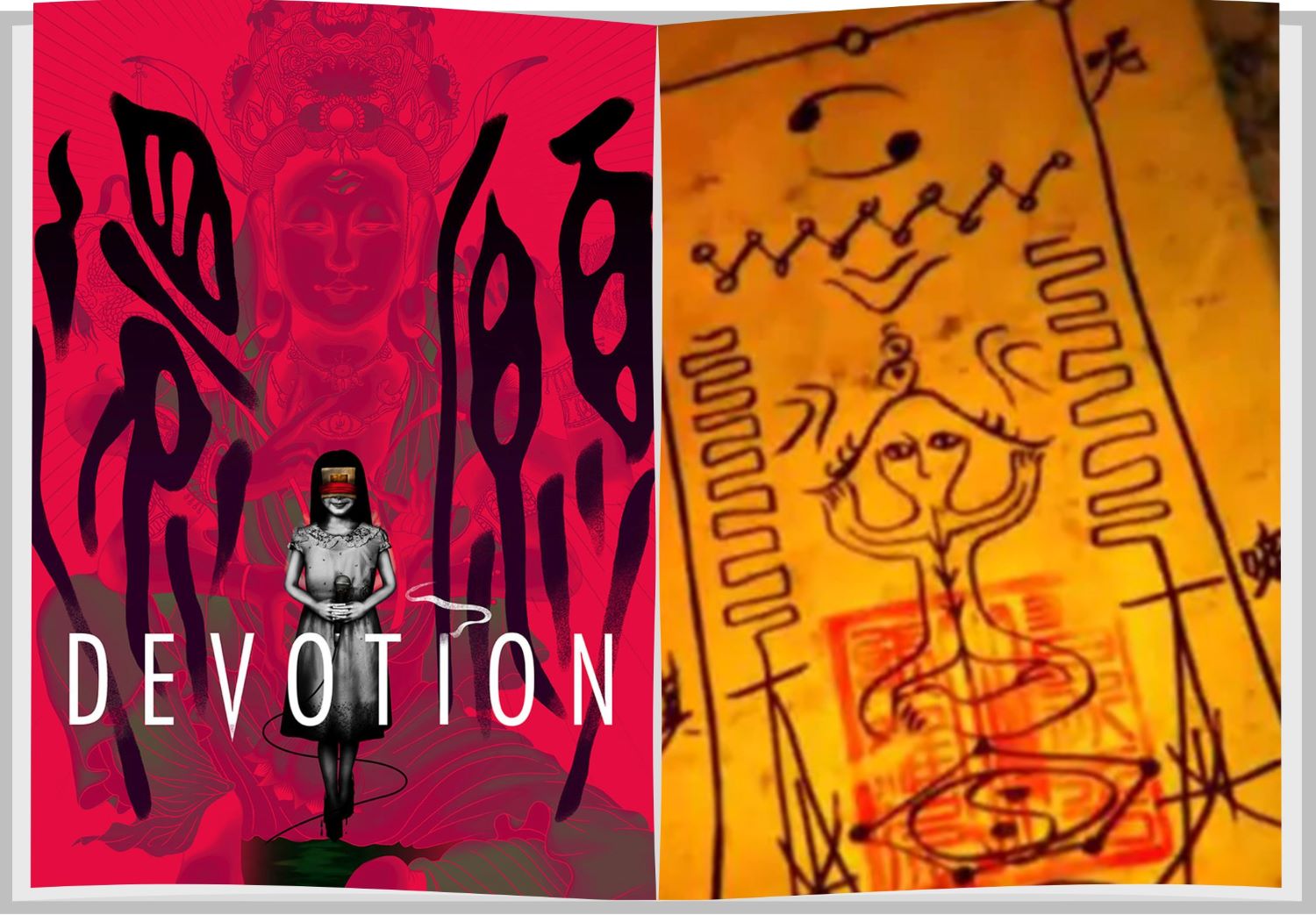
The invention of easter eggs in media, although far more interesting albeit considerately less delicious than the chocolate variety, has given games a transmedia quality that bleeds through into call-backs to other games, obscure pop culture references, and, as we will see, secret political commentary from the real world. The term “easter egg” in this context refers to a hidden reference, feature, or joke that can be found through in-game interactions, specific key inputs, or gaining access to secret game levels. 11 The easter egg in question was discovered in the horror game Devotion developed by the Taiwanese studio Red Candle Games. It appeared in the form of a discrete yellow poster found deep in the bowels of a digitally rendered 1980s Taiwan. The secret message could only be viewed if a player interacted with a poster found hanging on a wall. Upon interaction, it would then display the names, written in an ancient style of writing, of the President of China alongside the fictional character of “Winnie the Pooh” created by A. A. Milne. 12
Due to its secret nature, it was only found after release, but upon discovery, was subsequently banned, censored, and removed from China’s Steam store. The studio also issued an apology to any gamers who were offended by the ‘accidental’ inclusion of the poster and have offered refunds for anyone wishing to remove the game from their Steam library. Although this meme, which compares the Chinese President with the innocent fictional bear, could be considered a basic attempt at political commentary, it is nonetheless an example of freedom of expression and an attempt to evade censorship through a video game. 13
QR codes: A New Age form of Invisible Ink
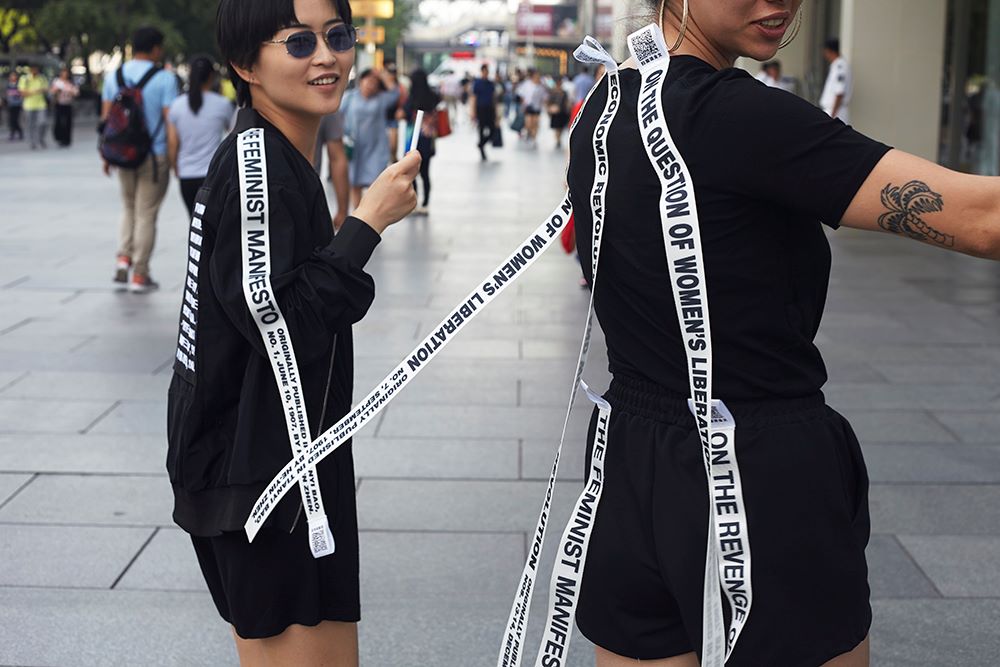
Picture this: It’s 2017 in Beijing, China. You’re walking down the street and you pass some people walking to your left and right. From the front they wear normal clothes, but as you pass them you notice white, trailing attachments that have English text and discrete QR codes written along it. Intrigued, you approach them and ask if you can scan the codes. As QR codes are ubiquitous in Beijing, you expect nothing of it until your scan loads a webpage giving you the option to download and read suppressed texts from 20th century radical anarchist feminist He Yinzhen. 14 This is the Thunderclap project undertaken by Amy Suo Wu, a Chinese born artist, designer, and teacher living in Rotterdam, Netherlands. This act of subversion utilizes modern technology to disseminate texts deemed unsuitable by authorities using the advent of unconventional clothing attachments to provide discrete access terminals to offline databases. Again, this is not dissimilar to The Uncensored Library, as both attempt to hide in plain sight using media and modern technology to allude government censors and promote the truth or ideas of marginalised groups in a safe and anonymous way.
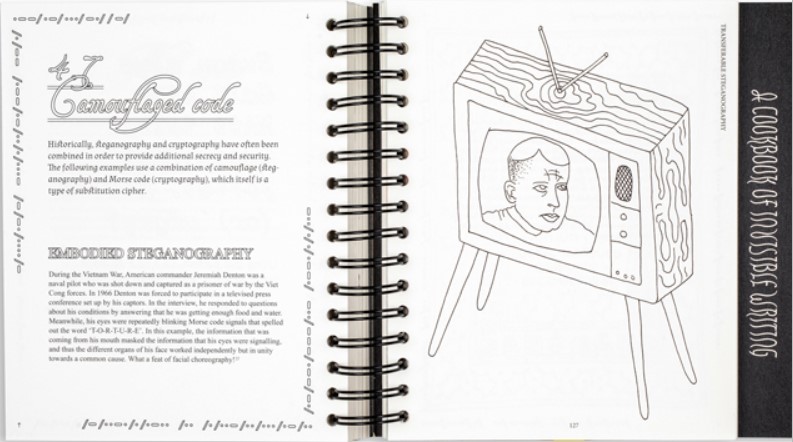
In addition, Wu has also created other bodies of work that utilise more analogue steganographic practices (an act of covered or concealed writing) as a means of “protection, survival, and resistance in the face of oppression and violence.” 15 Most notably, her published work titled A Cookbook of Invisible Writing, uses analogue forms of steganography, such as invisible ink, to “subvert surveillance”, “bypass censorship” and “[m]ake visible the struggles of marginalised cultures.” 16 As both these examples illuminate, as the censorship of the internet increases so must the creativity and adaptability of people increase. To maintain freedom in the presence of overwhelming oppression, users, like Amy Suo Wu, must continually push the boundaries of modern technology to communicate ideas that would be otherwise suppressed.
Memes and Emojis: A Modern Coded Language
“It’s a race to try to fool the censors…. The people are constantly coming up with creative new symbols.”
– Susan Herring, a linguist at Indiana University Bloomington
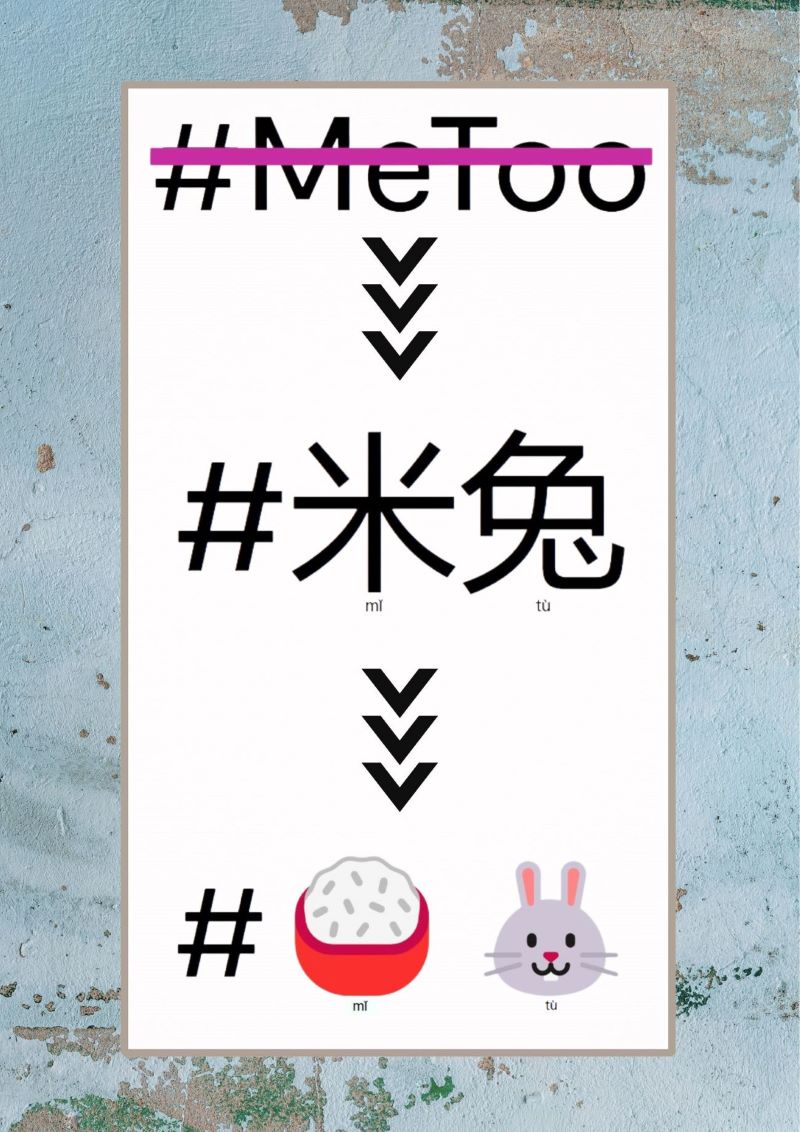
The communicative power of memes, emoticons, and slang has grown in recent years and has created a phenomenon of secret languages and meanings that can be rapidly dispersed globally. Although primarily a form of comedy, some subtler than others, it can also be seen as a tool to subvert censorship. Speaking in regards to social media platforms, researchers have found that “whenever online authorities . . . attempt to restrict speech on the Internet, people will find creative ways to subvert the rules. These strategies can be used to spread abuse—or to preserve freedom of expression.” 17
An example of this is the way people have used the nuances of language and emojis to evade government censors. The image above references the #MeToo movement in 2018, which aimed to promote a healthy discourse around sexual harassment. This movement, commonly spread through hashtags on social media, was blocked in certain countries leading people to adapt their approach of dissemination in creative ways. In China, people used the Chinese symbol for rice (米, “mí”) and bunny (兔,“tù”), to replace “#MeToo” with “#米兔”, allowing users to continue spreading awareness on social media despite the censorship – this was further refined to just the rice and bunny emojis, which proved even more effective in evading censorship. This example portrays an innovative method of subversion using modern technology and media to transcend international barriers and mask secret meanings inside of emoticons and language. 18
The Future of the Past, Our Present Future
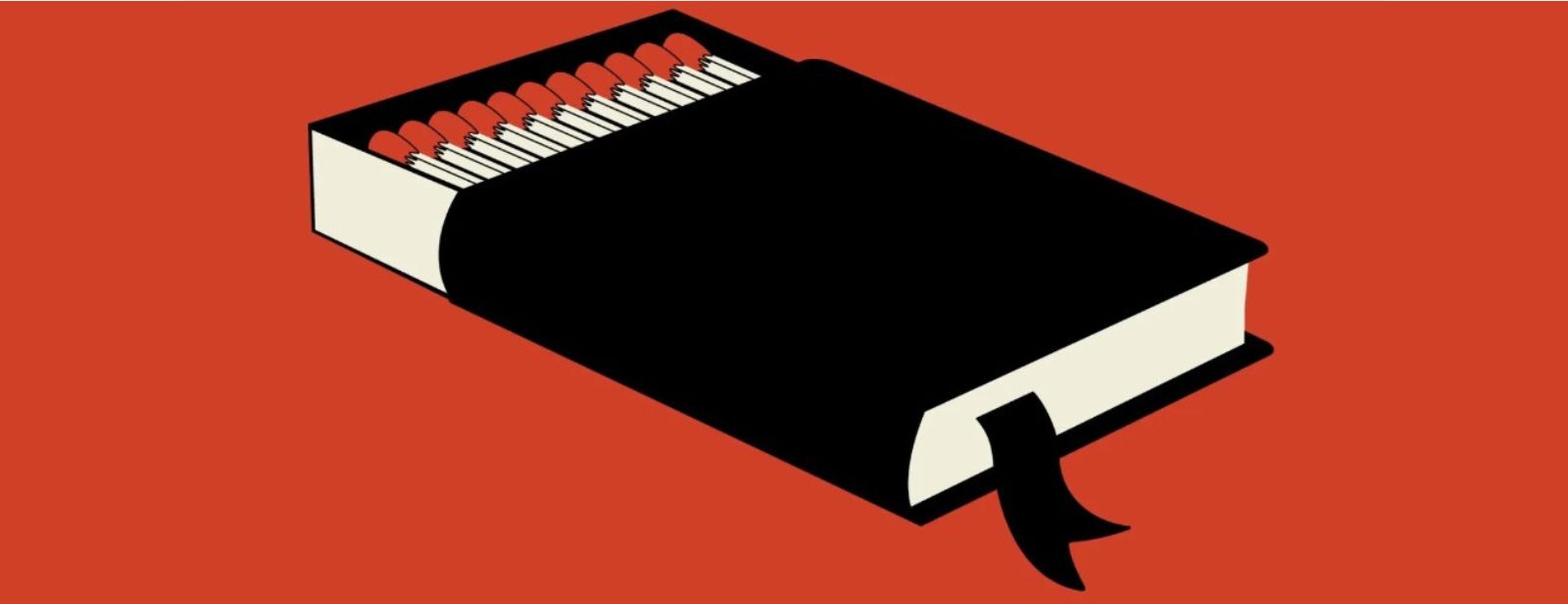
“To everything there is a season. Yes. A time to break down, and a time to build up. Yes. A time to keep silence and a time to speak. Yes, all that.”
– Bradbury, Ray. Fahrenheit 451
To conclude, the notion of freedom of the press exists so people can inform others of their experiences, report the truth of corruption and violence, and as a means to stay politically vigilant in a fast-paced, insatiable world. When this notion is abused and the truth is suppressed or altered, the door is opened wide for dangerous oppression of dystopian proportions to occur. For if the truth only exists in the mind of first hand experience, that information can be lost in death or imprisonment. Just as in Orwell’s 1984, if press freedom is not observed those in power can alter the history books until only those who actually experienced the events first-hand know the truth, and if those people are suppressed or media outlets shut down, that truth is eroded to the point of non-existence.
“Every record has been destroyed or falsified, every book rewritten, every picture has been repainted, every statue and street building has been renamed, every date has been altered. And the process is continuing day by day and minute by minute. History has stopped. Nothing exists except an endless present in which the Party is always right.”
– George Orwell, Nineteen Eighty-Four
It’s hard to believe that any society today could be compared in the slightest to Orwell’s fictional country of “Oceania” or the book burning firefighters in Ray Bradbury’s Fahrenheit 451. But believe it we must, with modern book burning still occurring as recently as 2010, as seen in the US, when roughly 10,000 copies of Anthony Shaffer’s Operation Dark Heart were purchased and destroyed by the US Department of Defense, in an effort to safe guard national security. While comically useless in the digital age to destroy physical books, it is nevertheless a concerning move by a democratic government. 19 While in other countries, history itself is being erased. Why? To broaden the distance between memory and fact in an effort to distance current authority from past atrocities. This can be seen in a recent story from Russia, where the Sakharov Centre, a leading human rights centre and pro-democracy foothold in Moscow, which works to preserve “a quarter of a century of Russian human rights work,” including the purges and prison camps initiated by Soviet leader Josef Stalin, is being closed and the occupants forcefully evicted as a “foreign agent.” 20
As described by the UN chief at a recent conference for “World Press Freedom Day” on May 4th, 2023, 21 truth is still being threatened by “disinformation and hate speech” as journalists and media outlets are being targeted – this can be seen with an increase of 50% in the killing of journalists in 2022. 22 In a globalised world, where average people have access to unprecedented levels of information on every topic and can watch livestreams of events happening in real time anywhere in the world, it is hard to imagine censorship as a major issue. But as this article has hopefully illuminated, censorship is still rampart in many countries leading individuals to seek creative ways of subversion through modern technology and popular media such as video games like Minecraft and innovative projects such as The Uncensored Library.
Please comment down below if you know of any other examples of video games or media being used to subvert modern censorship. This article is no way all encompassing in its examples, on the contrary, as it was rather difficult to find video game specific examples. This serves, at least to this author, as a call for more people to innovate and push the boundaries of what can be achieved through video games as a means of not only uninhibited political commentary, but as a means to create new forms of meaningful communication.
Works Cited
- Orwell, George. Nineteen Eighty-Four. Plume, 2022. ↩
- “The Uncensored Library.” uncensoredlibrary. 2020, https://www.uncensoredlibrary.com/en ↩
- Anastaplo, George. “History of Censorship.” Britannica. https://www.britannica.com/topic/censorship/History-of-censorship. ↩
- Anastaplo, George.”History of Censorship.” Britannica. https://www.britannica.com/topic/censorship/History-of-censorship. ↩
- Anastaplo, George. “Medieval Christendom.” Britannica. https://www.britannica.com/topic/censorship/Medieval-Christendom. ↩
- Milton, John. Areopagitica. 1644. ↩
- “The Constitution.” The White House. https://www.whitehouse.gov/about-the-white-house/our-government/the-constitution/#:~:text=The%20First%20Amendment%20provides%20that,for%20a%20redress%20of%20grievances. ↩
- “Universal Declaration of Human Rights.” United Nations. https://www.un.org/en/about-us/universal-declaration-of-human-rights. ↩
- Bernhard, Max. “On lockdown, Hong Kong activists are protesting in Animal Crossing.” Wired, 2020, https://www.wired.co.uk/article/animal-crossing-hong-kong-protests-coronavirus. ↩
- Bernhard, Max. “On lockdown, Hong Kong activists are protesting in Animal Crossing.” Wired, 2020, https://www.wired.co.uk/article/animal-crossing-hong-kong-protests-coronavirus. ↩
- Rouse, Margaret. “What is an Easter Egg?” Techopedia. 2018, https://www.techopedia.com/definition/3786/easter-egg#:~:text=An%20Easter%20egg%20is%20a,game%20or%20game%20file%20areas. ↩
- Allen, Kerry. “Taiwan game ‘Devotion’ upsets China with Winnie the Pooh reference.” BBC, 2019, https://www.bbc.com/news/world-asia-china-47361172. ↩
- Allen, Kerry. “Taiwan game ‘Devotion’ upsets China with Winnie the Pooh reference.” BBC, 2019, https://www.bbc.com/news/world-asia-china-47361172. ↩
- Simon-Kennedy, Kira. “Fighting Algorithmic Censorship.” Goethe Insitut. 2022, https://www.goethe.de/ins/us/en/kul/tec/23100078.html. ↩
- Suo Wu, Amy. Amy Suo Wu. 2023, https://amysuowu.net/. ↩
- Suo Wu, Amy. “A Cookbook of Invisible Writing.” Amy Suo Wu. 2023, https://amysuowu.net/content/cookbook-invisible-writing. ↩
- Hershberger, Scott. “Social Media Restrictions Cannot Keep Up with Hidden Codes and Symbols.” Scientific American. https://www.scientificamerican.com/article/social-media-restrictions-cannot-keep-up-with-hidden-codes-and-symbols/. ↩
- Tobin, Meaghan, and Katherine Lee. “How Chinese citizens use puns to get past internet censors.” restofworld. 2022, https://restofworld.org/2022/china-social-media-censorship/. ↩
- Aftergood, Steven. “Behind the Censorship of Operation Dark Heart.” Federation of American Scientists. 2010, https://fas.org/blogs/secrecy/2010/09/behind_the_censor/. ↩
- “Moscow human rights centre packs up as state tightens ‘monopoly on memory’.” channelnewsasia. 2023, https://www.channelnewsasia.com/world/moscow-human-rights-centre-packs-state-tightens-monopoly-memory-3443146. ↩
- “World Press Freedom Day 30th Anniversary – Shaping a Future of Rights: Freedom of expression as a driver for all other human rights.” UNESCO.org. 2023, https://www.unesco.org/en/days/press-freedom#:~:text=Every%20year%2C%203%20May%20is,the%20exercise%20of%20their%20profession. ↩
- Lederer M., Edith. “UN chief urges all nations to stop targeting media and truth.” LocalNews8. 2023, https://localnews8.com/news/ap-national/2023/05/02/un-chief-urges-all-nations-to-stop-targeting-media-and-truth/?utm_source=ground.news&utm_medium=referral. ↩
What do you think? Leave a comment.











This idea should be recreated in other popular games to increase the surface of accessibility as well as increasing player obscurity which will help with anonymity and security.
Never underestimate the amount of determination and time of Minecrafters.
Devotion is just absolutely amazing. It’s so disappointing that it was barely given a chance by producers, the story of this game is so much more realistic than some people realize. Obviously- there is some dramatization, but such is with a horror game. It still teaches you a very strong theme about how desperation and people’s greed can destroy someone in a matter of days. I think it gives you an important message, and the developers put hard and passionate work into everything.
It’s for sure one of my favorite games. 🙂
People who made these must’ve be on the government watchlist.
This library is overrated. You can’t really read anything you couldn’t find on the internet, it’s not like you choose a country and they have LOADS of books and secret documents of it. For all countries beside russia and like 3 other countries, they only have 1 book.
The purpose of the map was to provide information to people where this is blocked/illegal in their country. Minecraft was a loophole for them to view it.
Why is this making me extremely emotional. Great article and topic.
Thank you 🙂
Lovely read. Here is another game. “Joyful Executions”. It was banned from iOS because of satiring North Korea.
Thank you! Interesting, so it was banned in North Korea only? I image it would be quite popular in South Korea xD
A grand salute to these developers and journalists.
Let’s face it they do not want freedom of information or freedom of speech in any form.
What i find amazing, and even coming back to this. Is that the server is still very much alive. The fact that the government can’t do anything is fantastic because even if you get into minecrafts data banks, delete it all, hundreds of thousands of people still have the world downloaded probably… And there’s no stopping millions of people from continuing to reveal the truth.
Exactly! Because everyone downloads the save file, it is literally impossible to take down.
This library is a very ambitious idea, but the construction is simply too big. Its so much to load already as it is, that by the time it actually gets filled up with documents, loading may become a big issue.
I think this is a very good point. It is HUGE, and if you don’t have the required specs on your PC it would be difficult to access. Although, I suppose you could lower the graphics so you can simply get to the books without enjoying the architecture.
I’ve never played any video game, but I’ve been eager to try out this library.
It’s a shame that if Microsoft gets their way this library will most likely get censored after all. They even censored the word “Night”, “West” and several other completely innocent words. The new”profanity filter” is a buggy mess, and will most likely get worse since it can also get you permanently banned for imaginary offences now. I can only imagine how it will affect servers like this one.
So the Winnie the Pooh meme is that serious. China is extremely sensitive. even more sensitive that cancel culture. how does a nobody game get so much attention from the government. like how do they even know it exist let alone know about one graphic asset in the game? unless Chinese people themselves shared it and made it viral.
Imagine being so fragile that a Winnie the Pooh asset makes you feel big sad.
China is very sensitive to everything Taiwan. The wording in that game may make Chinese government not happy. It happen before. Also, Chian particularly do not like any ghostly and super natural stuff. They banned these contents in their own country all the time. They always consider Taiwan as part of their country. So, if or when Taiwan made something like this, the Chinese will make a noise. In the past it was no big deal, China still do not carry a lot of weight on their complaints. But now it different. They can threaten certain countries, and many many commercial company to comply with their bans. If not, China will sanction that country or company for not complying.
China sells tons of bootleg games and systems and their government doesnt step up to implement copyright laws but they do this for insulting their president?
Fuking wild idea. Minecraft for something good.
I really liked this article – censorship is and always has been such an important topic. I knew about the Minecraft ‘library’, but hadn’t heard about some of these other examples (like the rice/bunny ‘mi tu’ idea).
Thank you 🙂 I’m glad you enjoyed it
This shows that minecraft isnt just a video game.
Detention was a unique masterpiece, I really want to play Devotion now so bad.
This is the most gorgeous library.
is it just me that feels like this is underwhelming, i thought there would be loads of chests of books filled with different censored stories from each country. it feels more like a build showcase than something that could actually be useful for people
It is pretty amusing that we try to emulate real world library dimensions in a game, when you can have all the books in one folder, one square.
True but this is way more appealing, and makes the whole thing just feel as grand and as big as it really is. I mean this is an incredible achievement, it would be way to understated if they just put everything in a folder.
Exactly! I think beside serving a practical service, this library also serves as a symbol or grand spectacle to get attention on the issues, rather than functioning as a fully-fledged access point of information.
This is what Freedom of Press is about.
Just so you know there is no such thing as freedom of the press in any country. I can tell you this 1st hand as a journalist in the United States. Our work is always overseen, controlled and manipulated. If your work doesn’t fall within the state narrative it will never see the light of day unless you self publish at which point you will be smeared.
I actually tested this server today, there is absolutely no player activity, and all the information is outdated. Some countries have got new important things to mention about their freedom with the modern events, such as Russia that has massively degraded in the censorship along the wаr with Ukraine and is now close to a totalitarian regime.
Because there is so much new information daily, unfortunately it does take a while to implement updates I think. That’s why it serves more as a symbol.
Words cannot express how much respect i feel towards creators of this library.
It’s a nice idea, but I’ve been burned by such ideas before. More often than not, they reflect the bias of the people creating them and can end up just as oppressive to arguments and evidence against their biases as the governments they fight, just with less power to do harm to those that say things they don’t like.
Minecraft is the most anarchist game. haha
Me and the boys at 2 am reading the communist manifesto on Minecraft.
Imagine that this library exist irl.
All the countries would try to destroy it lol
The truth needs to be revealed in one or other way.
Regarding the library, the real question is where or who did they get this information from?
If you visit the website, the main contributors are listed (whether anonymously for safety regions or openly). Mostly, they are articles and writers that have been silenced or, in some cases, killed.